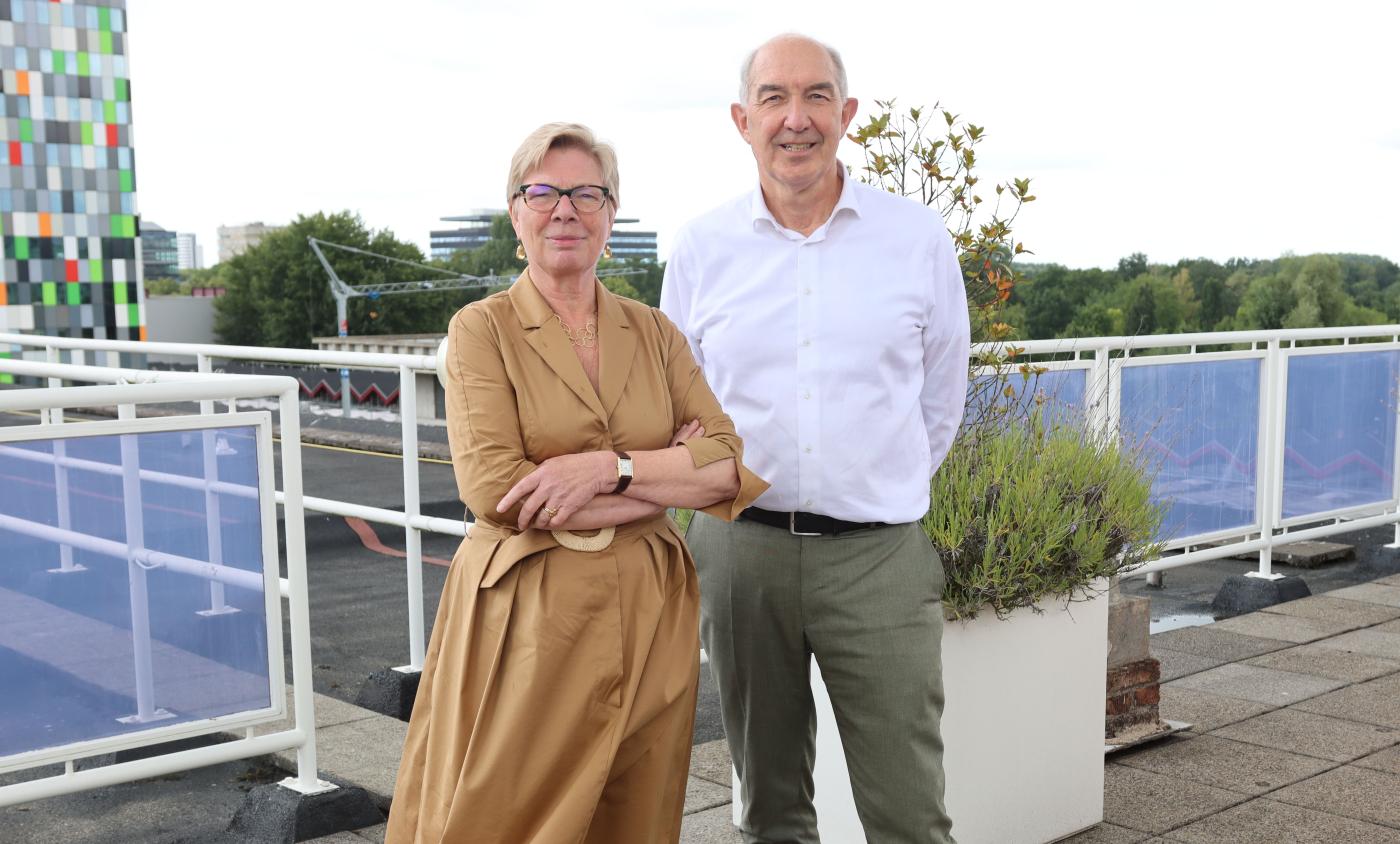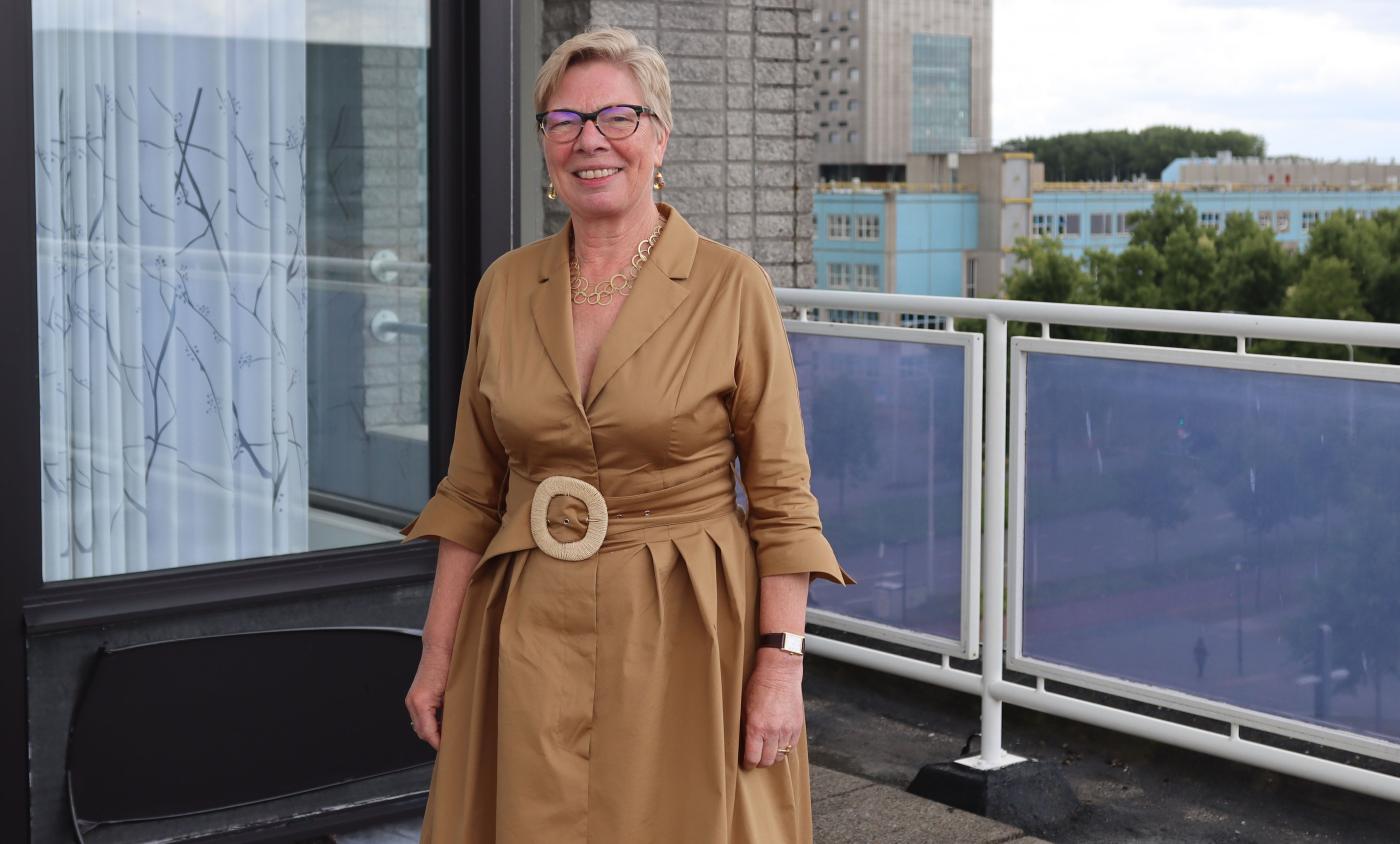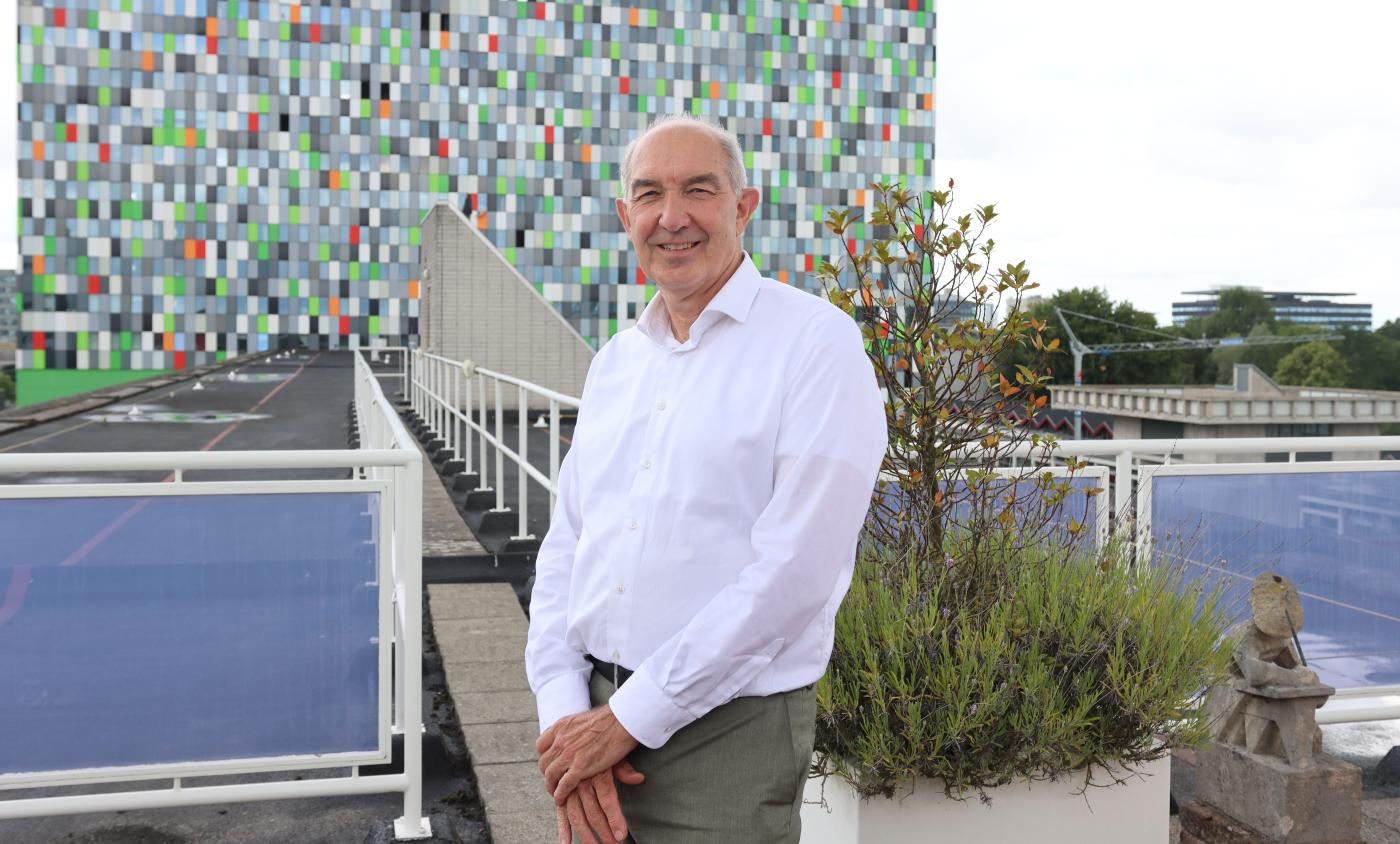UU's President and the chair of the Supervisory Board talk about the university's ambitions
‘Our strategic plan should not depend on the way the political wind blows’

How can a university make a difference in society? That is a key theme in the Strategic Plan 2030, unveiled by the Executive Board in June. ‘People need to feel that our university offers solutions to the problems they experience,’ says Karin Laglas, who has been serving as the chair of the Supervisory Board since August 2022. Laglas studied in Delft and was the dean of their Faculty of Architecture for several years.
The Supervisory Board advises the Executive Board in drafting the plan, which must ultimately be approved by the five members of the Supervisory Board. Laglas: "The Executive Board comes up with the ideas, and we contribute our thoughts during the process. For example, we examine whether the university community has been able to exert sufficient influence. Would the plan be widely supported?"
"The Supervisory Board also assesses whether the content is suitable for UU", Laglas continues. "Does it sufficiently highlight the excellence of the university's teaching and research? Has it taken current developments, such as artificial intelligence, into account? Finally, we assess the plan's feasibility. Is it achievable given the pressure on financial resources? How can we ensure that people don't leave? The workload is already high. The university attracts ambitious individuals, and there is a risk that they may become overwhelmed."

"The good thing about the Supervisory Board is that it includes people who work in different social fields. Their expertise gives you a broader perspective," adds UU President Anton Pijpers.
One of the points the Supervisory Board has emphasised is the need to keep the university's focus. Laglas: “The previous plan contained around sixty action points, which is quite a lot. Where do our priorities actually lie?”
Setting priorities straight was precisely what the board strived to achieve with the 2030 plan. Pijpers: 'We have come up with fifteen ambitions that we want to work on over the next few years. They build on what is already in place. Last time, we took the Sustainable Development Goals as our starting point, but many of those topics have already been implemented at the university. We are working on them intensively and therefore do not need to mention them again. Take diversity and inclusion, for example. That was an important point in the previous plan. We then launched the Equality, Diversity & Inclusion (EDI) programme. Now, diversity policy has found its place in every faculty and is being implemented at that level, so there's no need to mention it."
The university attracts ambitious individuals, and there is a risk that they may become overwhelmed
So where do those priorities lie? Laglas believes that UU should be connected with society, so much so that the members of the Supervisory Board pay close attention to that connection. She considers Utrecht University's decision to focus on interdisciplinarity to be key. “Take the field of sustainability, for example. In this area, Utrecht University really makes a difference in education and research. It starts with teaching young people how they can make the world more sustainable.”
Sustainability is currently a politically sensitive issue, which is why Laglas considers the autonomy of the university essential. The Supervisory Board embodies that autonomy. ‘Although the members are appointed by the Minister of Education, Culture and Science, the minister has no influence on how we work. I meet twice a year with the other chairs of Supervisory Boards. The minister is also present at those meetings.’
Pijpers: ‘Politicians should not dictate what universities do. Our strategy should not depend on the whims of the political wind. We seek contact with society, it's about connecting with people. If we become detached from society, we become a pawn in short-term politics.’
According to Pijpers, the university must continually demonstrate its added value to society and clearly explain its role as a higher education institution. ‘We are not an elite club that tells people what to do. We present facts, show their consequences and offer possible solutions. In doing so, we must set a good example ourselves.’ Laglas adds: ‘Universities look to the distant future. They provide solutions based on factual analyses and not on a politically driven image.’
If the university becomes detached from society, it becomes a pawn of short-term politics
Another priority in the Strategic Plan for 2030 is the focus on the university community, which is one of the things that strikes Laglas the most about UU. ‘There is a lot of communication, a lot of involvement and attention for each other.’
Pijpers notes that the previous plan already mentioned the university community. ‘Steps have been taken, particularly in the area of social safety. But it is not enough. In this plan, we strive for a culture of speaking up, discussing, agreeing on, and addressing issues. We must dare to correct each other. Open Science is also entering a new phase with the Recognition & Rewards programme, which focuses on teamwork and places less emphasis on hierarchy. That is good for the community and social safety."
The university community has experienced some unrest in recent years. Students and staff have expressed their dissatisfaction with the university's cooperation with the fossil fuel industry and failure to sever all ties with Israel. However, these issues are not explicitly mentioned in the Strategic Plan.

Pijpers: “We haven't mentioned all the current issues, but we place them in a broader context. Regarding sustainability, we have stated that our research must align with the Paris Climate Agreement, which also has consequences for the choices made by our partners. We always consider alternatives for each project, but we do not exclude the fossil fuel industry. Instead, we investigate how we can best achieve improvement. We have an assessment framework to monitor this properly. We ask experts to provide advice, and then we establish those. Then, we assess each project against that framework. We do the same when it comes to cooperation with international partners in war zones, such as Israel. We do not link it to a single country, but rather establish a general framework. This allows us to carefully select our partners."
Pro-Palestine activists are unsatisfied with this position, and they made themselves heard by occupying UU buildings. To what extent are these occupations discussed with the Supervisory Board? Laglas: "That certainly comes up. We act as a sounding board for the board. We believe it is essential for the board to engage in dialogue with activists, while also acknowledging the complexities involved. It is impressive how the Executive Board is handling this. A dialogue must be two-sided. You may be convinced that you are right, but you must also accept that certain issues can be viewed differently."
One of the things that strikes me about Utrecht University is its strong focus on community
The University Council discussed the new strategic plan in June and raised questions about its feasibility. The Supervisory Board is concerned about the same thing. The upcoming austerity measures make it difficult to achieve ambitious goals.
Anton Pijpers does not view this as a significant problem. "The previous Strategic Plan was delayed by six months because we were in the middle of the coronavirus pandemic. Despite the obstacles caused by the virus, we did not adjust our ambitions. They remained rock solid. The same applies now, with the threat of budget cuts, though we must adapt when circumstances require it. We must keep our eyes open."
The UU President continues: "The faculties will have to translate the current ambitions into annual plans. Each year, they will indicate what they plan to implement, taking circumstances into account. So, they will have to adapt the implementation and the pace to what is feasible."
According to Pijpers, the same applies to the university's aim of achieving CO2 neutrality by 2030. "Due to various circumstances, it will not be possible to phase out natural gas before then. We must deal with that reality. But the goal remains."
We strive for a culture of speaking up, discussing, agreeing and addressing issues. We must dare to correct each other
In any case, Pijpers notes that this Strategic Plan places more emphasis on business operations. Not only in the area of sustainability, but also in terms of administrative systems and real estate. "We will have to replace the current SAP administration programme, which will be a huge operation. Additionally, we will need to intensify our work on our real estate portfolio, as is outlined in the Strategic Plan. Initial plans are now on the table and need to be worked out in detail.’
Laglas states that the Strategic Plan is a clear and easy-to-read document with well-defined ambitions. These ambitions are not without obligation, and the Supervisory Board will monitor them in the coming years. Pijpers: "We are going to work with a portfolio management system, in which we collect all the information and monitor exactly where we stand with the realisation of our goals on an annual basis.’
Comments
We appreciate relevant and respectful responses. Responding to DUB can be done by logging into the site. You can do so by creating a DUB account or by using your Solis ID. Comments that do not comply with our game rules will be deleted. Please read our response policy before responding.